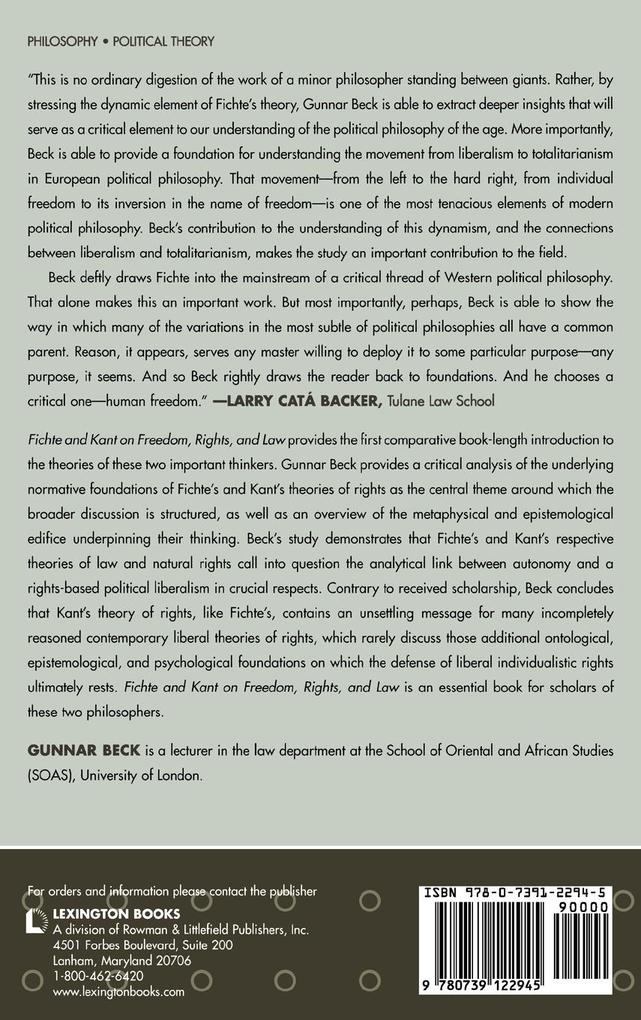
Zustellung: Sa, 07.06. - Do, 12.06.
Versand in 1-2 Wochen
VersandkostenfreiBestellen & in Filiale abholen:
Gunnar Beck provides the first comparative book-length introduction to Fichte's and Kant's theories of freedom, law, and politics, together with an overview of the metaphysical and epistemological edifice underpinning their thinking. He offers a critical analysis of the underlying normative foundations of Kant's and Fichte's theories of rights and questions the analytical link between the idea of freedom as rational self-determination or autonomy and a rights-based political liberalism.
Inhaltsverzeichnis
Chapter 1 Introduction Chapter 2 Chapter 1: The Relation Between Freedom and Morality in Kant's and Fichte's Practical Philosophy Chapter 3 Chapter 2: Fichte's Early Theory of Rights Chapter 4 Chapter 3: Fichte's Later Theory of Self-Consciousness and Freedom Chapter 5 Chapter 4: Fichte's Perfectionist Theory of Politics Chapter 6 Chapter 5: Immanuel Kant's Theory of Rights Chapter 7 Conclusion
Produktdetails
Erscheinungsdatum
21. Februar 2008
Sprache
englisch
Seitenanzahl
258
Autor/Autorin
Gunnar Beck
Verlag/Hersteller
Produktart
gebunden
Gewicht
574 g
Größe (L/B/H)
235/157/20 mm
ISBN
9780739122945
Entdecken Sie mehr
Pressestimmen
This is no ordinary digestion of the work of a minor philosopher standing between giants. Rather, by stressing the dynamic element of Fichte?s theory, Beck is able to extract deeper insights that will serve as a critical element to our understanding of the political philosophy of the age. More importantly, Beck is able to provide a foundation for understanding the movement from liberalism to totalitarianism in European political philosophy. That movement?from the left to the hard right, from individual freedom to its inversion in the name of freedom, is one of the most tenacious elements of modern political philosophy. Beck?s contribution to the understanding of this dynamism, and the connections between liberalism and totalitarianism makes the study alone an important contribution to the field. Beck deftly draws Fichte into the mainstream of a critical stream of Western political philosophy. That alone makes this an important work. But most importantly, perhaps, Beck is able to show the way in which manyof the variations in the most subtle of political philosophies, all have a common parent. Reason, it appears, serves any master willing to deploy it to some particular purpose?any purpose, it seems. And so, Beck rightly draws the reader back to foundatio -- Larry Cata Backer, Tulane Law School This is no ordinary digestion of the work of a minor philosopher standing between giants. Rather, by stressing the dynamic element of Fichte's theory, Beck is able to extract deeper insights that will serve as a critical element to our understanding of the political philosophy of the age. More importantly, Beck is able to provide a foundation for understanding the movement from liberalism to totalitarianism in European political philosophy. That movement-from the left to the hard right, from individual freedom to its inversion in the name of freedom, is one of the most tenacious elements of modern political philosophy. Beck's contribution to the understanding of this dynamism, and the connections between liberalism and totalitarianism makes the study alone an important contribution to the field. Beck deftly draws Fichte into the mainstream of a critical stream of Western political philosophy. That alone makes this an important work. But most importantly, perhaps, Beck is able to show the way in which many of the variations in the most subtle of political philosophies, all have a common parent. Reason, it appears, serves any master willing to deploy it to some particular purpose-any purpose, it seems. And so, Beck rightly draws the reader back to foundations. And he chooses a critical one-human freedom. -- Larry Cata Backer, Tulane Law School
Bewertungen
0 Bewertungen
Es wurden noch keine Bewertungen abgegeben. Schreiben Sie die erste Bewertung zu "Fichte and Kant on Freedom, Rights, and Law" und helfen Sie damit anderen bei der Kaufentscheidung.











